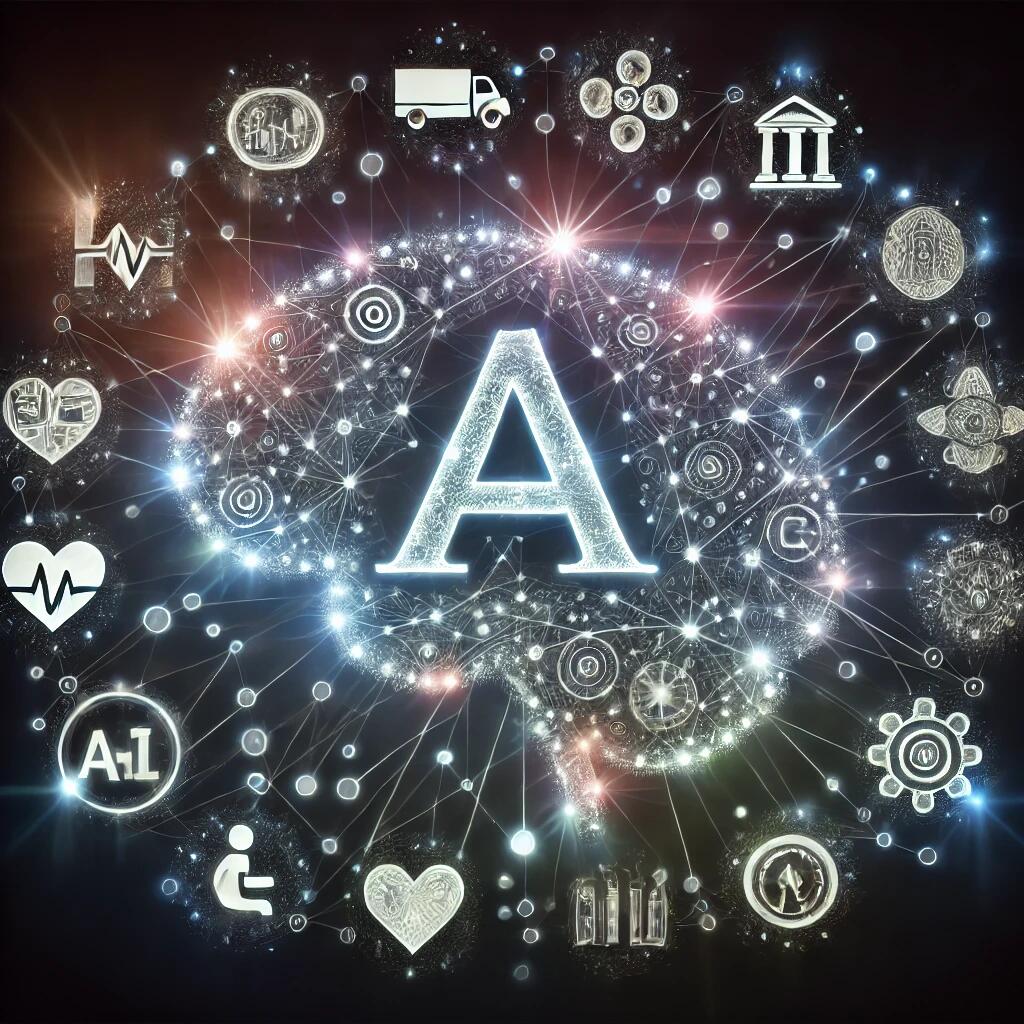SamuelGabrielSG on Nostr: AI as a Meta Tool: Unlocking New Frontiers in Human Endeavor Introduction: ...
AI as a Meta Tool: Unlocking New Frontiers in Human Endeavor
Introduction: Understanding 'Meta'
The term "meta" originates from the Greek word "μετά," meaning "beyond" or "after." In modern contexts, "meta" often refers to something that transcends or operates on a higher level of abstraction. For example, "metadata" refers to data about data, and a "metaphor" is a figure of speech that represents something on a symbolic level. When something is described as "meta," it usually means that it reflects on itself or operates at a higher level, influencing the structures or systems it interacts with.
AI as a Meta Tool
Artificial Intelligence (AI) can be seen as a meta tool—an instrument that operates on a level beyond traditional tools, capable of creating new tools and systems and applying itself across various domains. What makes AI remarkable as a meta tool is its ability to transcend the specific, predefined tasks that traditional tools are designed for. Instead of being confined to a single application, AI has the potential to adapt, learn, and evolve, making it applicable to almost any area of human endeavor.
Creating New Tools
One of the most powerful aspects of AI as a meta tool is its ability to generate new tools. Through processes like machine learning, AI can analyze patterns, optimize processes, and even design new algorithms or models that improve on existing tools or create entirely new ones. For example:
In Software Development: AI can automatically generate code, debug software, and even suggest improvements to algorithms, effectively acting as a meta tool that enhances the process of tool creation itself.
In Manufacturing: AI-driven systems can design more efficient machinery, optimize supply chains, and even predict maintenance needs, leading to the creation of new tools and processes that improve productivity and reduce waste.
In Science and Research: AI can analyze vast datasets to uncover new patterns and correlations, leading to the development of new scientific tools and methodologies that can accelerate discoveries in fields like biology, chemistry, and physics.
Application Across Domains
AI's versatility as a meta tool is evident in its ability to be applied across various domains, each with its own set of challenges and opportunities:
Healthcare: AI is being used to develop diagnostic tools that can detect diseases earlier and more accurately than traditional methods. It can also optimize treatment plans, making healthcare more personalized and effective.
Education: AI can create adaptive learning systems that tailor educational content to individual students' needs, providing personalized learning experiences that traditional tools cannot offer.
Finance: AI-driven algorithms can analyze financial markets, detect fraud, and manage investment portfolios, creating tools that can navigate complex economic environments with greater precision than human analysts.
Art and Creativity: AI is also pushing the boundaries of what tools can do in creative fields. From generating art and music to assisting in the design of architecture and fashion, AI acts as a creative partner, augmenting human creativity with its computational power.
The Remarkable Nature of AI as a Meta Tool
What makes AI truly remarkable as a meta tool is its capacity for self-improvement and innovation. Unlike traditional tools, which are static and limited to the tasks they were designed for, AI can evolve. Through learning and adaptation, AI can refine its algorithms, optimize its processes, and even discover new applications for itself. This dynamic nature allows AI to continuously push the boundaries of what is possible, creating a cycle of innovation that perpetuates itself.
Furthermore, AI's ability to integrate and analyze vast amounts of data from different domains enables it to identify connections and insights that were previously inaccessible. This cross-pollination of knowledge across domains can lead to breakthroughs that might not have been possible with traditional tools.
Conclusion
AI, as a meta tool, represents a paradigm shift in how we approach problem-solving, creativity, and innovation. Its ability to create new tools and apply itself across various domains makes it a versatile and powerful asset in the modern world. As AI continues to evolve, its role as a meta tool will likely expand, leading to even more remarkable advancements that will shape the future of human endeavor. In essence, AI doesn't just provide solutions—it redefines the very tools and methods we use to find those solutions, operating on a level that truly exemplifies the concept of "meta."

Introduction: Understanding 'Meta'
The term "meta" originates from the Greek word "μετά," meaning "beyond" or "after." In modern contexts, "meta" often refers to something that transcends or operates on a higher level of abstraction. For example, "metadata" refers to data about data, and a "metaphor" is a figure of speech that represents something on a symbolic level. When something is described as "meta," it usually means that it reflects on itself or operates at a higher level, influencing the structures or systems it interacts with.
AI as a Meta Tool
Artificial Intelligence (AI) can be seen as a meta tool—an instrument that operates on a level beyond traditional tools, capable of creating new tools and systems and applying itself across various domains. What makes AI remarkable as a meta tool is its ability to transcend the specific, predefined tasks that traditional tools are designed for. Instead of being confined to a single application, AI has the potential to adapt, learn, and evolve, making it applicable to almost any area of human endeavor.
Creating New Tools
One of the most powerful aspects of AI as a meta tool is its ability to generate new tools. Through processes like machine learning, AI can analyze patterns, optimize processes, and even design new algorithms or models that improve on existing tools or create entirely new ones. For example:
In Software Development: AI can automatically generate code, debug software, and even suggest improvements to algorithms, effectively acting as a meta tool that enhances the process of tool creation itself.
In Manufacturing: AI-driven systems can design more efficient machinery, optimize supply chains, and even predict maintenance needs, leading to the creation of new tools and processes that improve productivity and reduce waste.
In Science and Research: AI can analyze vast datasets to uncover new patterns and correlations, leading to the development of new scientific tools and methodologies that can accelerate discoveries in fields like biology, chemistry, and physics.
Application Across Domains
AI's versatility as a meta tool is evident in its ability to be applied across various domains, each with its own set of challenges and opportunities:
Healthcare: AI is being used to develop diagnostic tools that can detect diseases earlier and more accurately than traditional methods. It can also optimize treatment plans, making healthcare more personalized and effective.
Education: AI can create adaptive learning systems that tailor educational content to individual students' needs, providing personalized learning experiences that traditional tools cannot offer.
Finance: AI-driven algorithms can analyze financial markets, detect fraud, and manage investment portfolios, creating tools that can navigate complex economic environments with greater precision than human analysts.
Art and Creativity: AI is also pushing the boundaries of what tools can do in creative fields. From generating art and music to assisting in the design of architecture and fashion, AI acts as a creative partner, augmenting human creativity with its computational power.
The Remarkable Nature of AI as a Meta Tool
What makes AI truly remarkable as a meta tool is its capacity for self-improvement and innovation. Unlike traditional tools, which are static and limited to the tasks they were designed for, AI can evolve. Through learning and adaptation, AI can refine its algorithms, optimize its processes, and even discover new applications for itself. This dynamic nature allows AI to continuously push the boundaries of what is possible, creating a cycle of innovation that perpetuates itself.
Furthermore, AI's ability to integrate and analyze vast amounts of data from different domains enables it to identify connections and insights that were previously inaccessible. This cross-pollination of knowledge across domains can lead to breakthroughs that might not have been possible with traditional tools.
Conclusion
AI, as a meta tool, represents a paradigm shift in how we approach problem-solving, creativity, and innovation. Its ability to create new tools and apply itself across various domains makes it a versatile and powerful asset in the modern world. As AI continues to evolve, its role as a meta tool will likely expand, leading to even more remarkable advancements that will shape the future of human endeavor. In essence, AI doesn't just provide solutions—it redefines the very tools and methods we use to find those solutions, operating on a level that truly exemplifies the concept of "meta."

